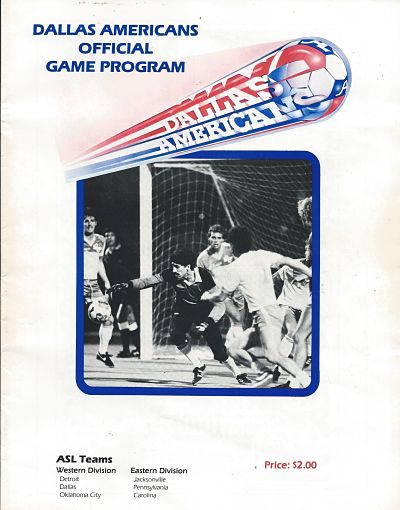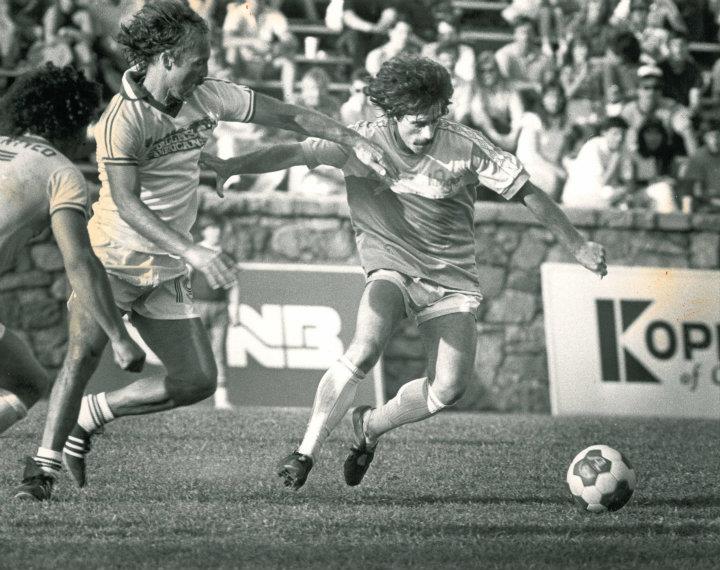Last month, I published a piece on the early history of professional soccer in Dallas, concluding with the folding of the original Dallas Sidekicks. While the Tornado and Sidekicks were easily the biggest teams in town before MLS arrived, they were far from the only professional soccer teams that played in the Metroplex.
Dallas Americans

When the Dallas Tornado folded in 1981, they left a void of any professional soccer that wouldn’t be filled until the spring of 1983.
With the NASL perpetually on the verge of collapse, teams looked to their quasi-official second league, the American Soccer League, for refuge. Yet, instability was a regular part of this league as well, with 4 of the 7 teams folding between the 1982 and 1983 seasons.
Former Dallas Tornado midfielder Bobby Moffat purchased the rights to the long-dormant Golden Gate Gales franchise and relocated it to Dallas for the 1983 season.

With the league only hosting 6 teams, each team would play the other 5 five times, an unusual odd season length.
Playing out of Plano’s Clark Stadium, the Americans would prove to be the class of their division, winning 13 games, losing 12, and receiving the only playoff berth in their division. Dallas faced the Pennsylvania Stoners in the Semi-Finals, losing the first game in Bethlehem, winning the second in Plano, and losing the sudden death mini-game 1-0.
Quite a few notable names played for the Americans that season. Former Tornado players Neil Cohen and Billy Phillips, Wolfgang Rausch as player-coach, former Brazilian international Zequinha, indoor legend Kim Røntved, and the late Jeff Bourne all took part in the 1983 season, with Bourne leading the league with 17 goals.
Unfortunately, the league collapsed at the end of the season, foreshadowing the oncoming demise of the NASL, and the Americans moved to the upstart United Soccer League.

United Soccer League
This new league became the de facto American 2nd division for 1984, with 9 teams in total. Dallas would join the Western Division along with fellow ASL refugee Oklahoma City Slickers (renamed Stampede for 1984) and a new team in Houston, the Houston Dynamos.

While the Americans posted a winning 14-10 record, the league’s unusual standings system left them 3rd in their division behind 13-11 Houston and needing to win a wild card game in Houston to make the semi-finals. Houston’s Jose Neto scored twice to defeat Dallas 2-1.
The 1985 season would prove to be utterly shambolic. In the winter of 1984, the NASL was circling the drain and entered negotiations with the USL to merge in order for some sort of pro soccer league to survive. The negotiations collapsed in February of 1985, and on March 5, the merger was officially called off. The NASL almost immediately folded, along with 6 USL teams.
The USL attempted to salvage a season with the remaining 3 teams plus an expansion side in El Paso, but that original schedule too fell through before a ball was kicked. The El Paso side nearly folded save for a last-minute bailout, and the Dallas Americans had to grant players stock in the team in lieu of unpaid salaries just to get the players to commit to the season.
By May, the league had settled on a split-season format, with an abbreviated “League Cup” where the teams would play a 6-game mini-season with the top team winning the “Cup”, followed by a 12-week regular season. The cup season saw Tulsa simply not turn up for a game in Dallas among other chaotic events, with Florida eventually winning it with a 4-0-2 record. The league was in such dire straits that no physical trophy was awarded for this Cup.
The Americans traveled to Lockhart Stadium in Ft. Lauderdale for the opening match of the planned regular season. Former Iranian international Hassan Nazari gave Dallas a 1-0 lead in the 13th minute, but USA international Boris Bandov drew it level in the 75th. Legendary Dutch midfielder Johan Neeskens put the Sun ahead in his lone match for the team, while Bandov added a 3rd in the dying moments to secure the win. The match would prove to be the only match played in the regular season with the league collapsing just 3 days later, taking the remaining teams with it.
Quick aside, Neeskens had actually signed a 3-year contract with the South Florida Sun just days before the abandoned season began. He would never receive a paycheck.
Dallas Mean Green
In the early 1980s, a group largely comprising alumni of then-North Texas State University’s soccer program formed the Dallas Mean Green, an amateur league team that competed in a number of local and regional leagues.
By 1984, the team was an amateur powerhouse, winning the National Amateur Cup over Detroit Ukrainian SC. The group had professional aspirations, and for 1987, entered the outdoor upstart Lone Star Soccer Alliance as the Dallas Express.
Their strength in the amateur game translated immediately to success in the LSSA, as the Express won every game played through the first three seasons, only losing the 1989 championship final to the Austin Thunder 3-2.
The team changed names and venues frequently, playing as the Dallas Express in 1987, Mean Green in 1988, F.C. Dallas from 1989 through 1991, and the final season as Dallas Inter. In total, through the LSSA’s six seasons of play, the vagabond Dallas team achieved a record of 53-1-18 in the regular season with 6 regular season titles, 4 championships, and never failed to make the playoff final. They won a second National Amateur Cup in 1988 and made the Open Cup Semifinals 3 times.
Sadly, the team folded along with the league in 1992, and little history has survived from the LSSA.
